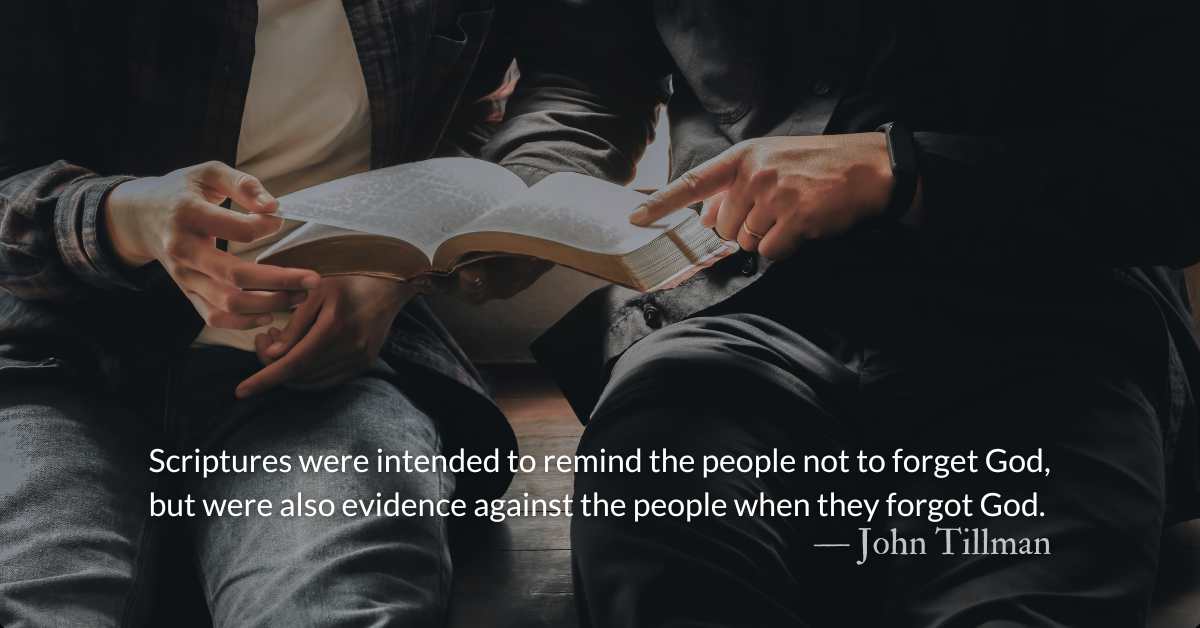Links for today’s readings:
Read: Joshua 24 Listen: (5:49) Read: 1 Timothy 1 Listen: (2:59)
Scripture Focus: Joshua 24.24-27
24 And the people said to Joshua, “We will serve the Lord our God and obey him.” 25 On that day Joshua made a covenant for the people, and there at Shechem he reaffirmed for them decrees and laws. 26 And Joshua recorded these things in the Book of the Law of God. Then he took a large stone and set it up there under the oak near the holy place of the Lord. 27 “See!” he said to all the people. “This stone will be a witness against us. It has heard all the words the Lord has said to us. It will be a witness against you if you are untrue to your God.”
Reflection: The Testimony of Scripture
By John Tillman
We sometimes overlook how politically odd the Hebrew community was. Moses was their singular spiritual, civil, and military leader, but he was not a king. He did not extract wealth from the people or pass down leadership in his family line. Tribes chose for themselves leaders who exercised delegated authority. (Deuteronomy 1.13-17)
Joshua took over this role from Moses, but did not hand it down to anyone as he stepped down from his position. Joshua essentially turned the people over to lead themselves as they followed God under the guidance of the priests and elders. It wasn’t exactly representative governance, but it was a stark differentiation from the despotism that was typical in that region and time period.
Many passages in the Bible describe how the documents that became the Bible came to be. They often are moments of transition, victory, or recommitment. This moment in Joshua is all three. Joshua reaffirmed the spiritual covenant and the decrees and laws, then wrote them down for the people. This would have included the writings compiled by Moses in other similar moments. (Exodus 17.14; 34.27-28; Deuteronomy 17.18; 27.3-8; 31.19-26)
Many times the writings are described as witnesses against the people. Scriptures were intended to remind the people not to forget God, but were also evidence against the people when they forgot God. The written words left no excuse for future wickedness.
Like the Israelite tribes, we do not have a tyrant over us forcing us to “do righteousness.” That’s how empires work—idealistic principles at the top and wicked brutality at ground level. However, we are representative ambassadors of a different kind of kingdom. Christ is our true king. His kingdom “comes from another place” and is not established by violence. (John 18.36-37) We announce and represent Jesus’ kingdom which frees us from the empires we live among. (Luke 4.16-21)
However, being Christ’s representatives brings responsibilities. We are accountable to Christ’s new covenant and the wisdom gained from the whole of scripture. We need regular reminders of God’s faithfulness and our unfaithfulness. This is not for our discouragement but for our encouragement.
Make the Bible your teacher and listen to its testimony through the Holy Spirit. When we transgress, its words testify against us. When we repent they redeem us. When we obey, they help us repair and restore wrongs. Jesus’ words are life for us and his wisdom comes to us from every corner of scripture. Eat, heed, and live out Jesus words.
Divine Hours Prayer: A Reading
Jesus taught us, saying: “I am the true vine, and my Father is the vinedresser. Every branch in me that bears no fruit he cuts away, and every branch that does bear fruit he prunes to make it bear even more. You are pruned already, by means of the word that I have spoken to you.” — John 15.1-3
– Divine Hours prayers from The Divine Hours: Prayers for Summer
by Phyllis Tickle
Read more: Streams of Scripture
When you know the scriptures inside and out, they get inside you and come out of you…we can search our souls for streams of scripture.
Read The Bible With Us
Invite friends to drink deeply of the scripture with you. Join our Bible reading plan at a sustainable, two-year pace.






